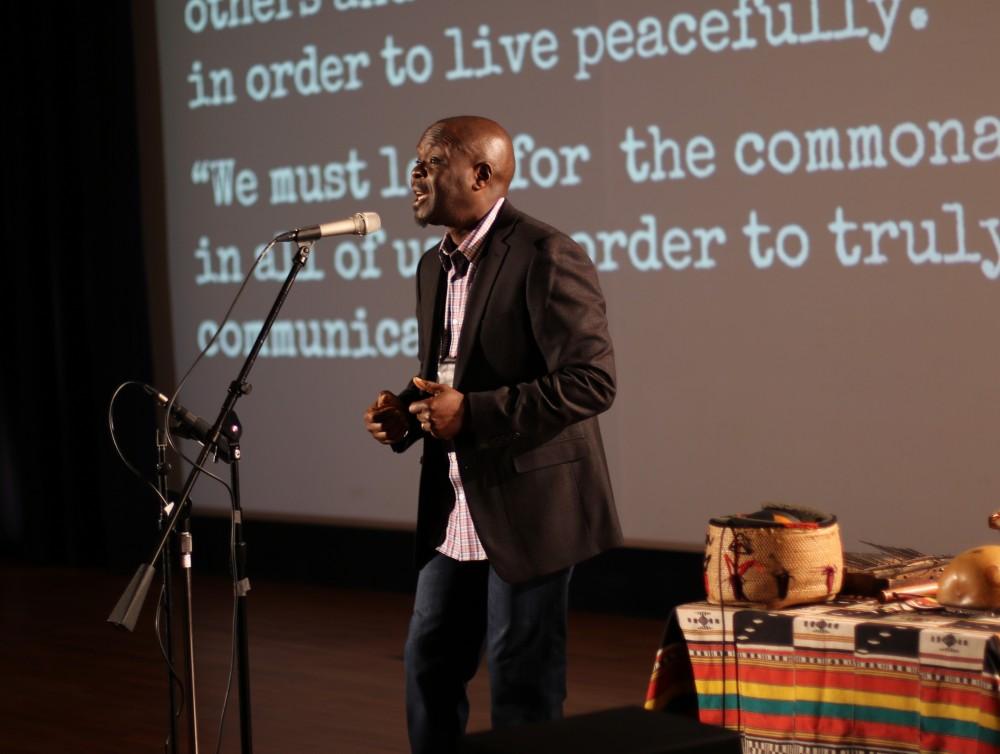Ugandan musician Samite Mulondo spreads positivity, healing through African music at GVSU

GVL/Sanda Vazgec – Samite Mulondo plays traditional African instruments at Loosemore Auditorium Tuesday, Oct. 11, 2016.
Oct 13, 2016
Rhythmic beats, floating melodies and impactful lyrics are the main components needed to create African music. These are also the elements Ugandan musician Samite Mulondo uses to spread hope, healing and peace around the world.
Mulondo presented “Lessons of Humanity, What My Grandfather Taught Me” in the Loosemore Auditorium at Grand Valley State University Tuesday, Oct. 11. In a discussion intertwined with musical performance, he shared his stories of being a refugee, his efforts to heal those in difficult circumstances and explained how the fabric of his life was created by his grandfather’s knowledge.
The audience sat attentively as Mulondo filled the room with the melodic, whimsical sound of the kalimba, a small thumb piano generating sounds similar to those of a xylophone. The music lead into the narrative of his life and this pattern of dialogue and performance continued throughout the night.
Motivated by his grandfather’s influence never to focus on material things, Mulondo grew up spending his time immersed in music, paying more attention to something he could do instead of the things he could have.
Mulondo shared the story of his childhood, one filled with happiness, family and music. However, his life was abruptly changed when a dictator came to power in Uganda. He fled to Kenya soon after where he spent time in a refugee camp, here his grandfather’s lessons came to fruition.
“Once you take away all of the material things you find that we are all human beings,” Mulondo said. “You all want to laugh, you all want to eat, you all want to sleep.”
Eventually relocating to New York, Mulondo kept his passion for music alive and connected with other musicians in the area.
He was approached to take part in an opportunity to go back to Africa and share his music with people in Liberia. Though hesitant at first, he accepted the opportunity and realized the power of music while he was there.
While playing the flute for a group of children, he noticed more people starting to gather around. Soon, the mothers started to sing along with the children and Mulondo described how the dark cloud over their lives seemed to float away.
“I realized I could help people sing again,” Mulondo said. “People would start talking about the future, they had hope again.”
Mulondo grew up with a strong encouragement to give back, set by the example of his stepfather and a passion for music he realized when he heard his grandfather play the flute for the first time. He decided to combine his two passions and help others by using music to heal.
He created Musicians for World Harmony, an organization dedicated to helping people affected by war, HIV/AIDS and other tragedies. His most prominent work deals with child soldiers, a huge problem in some African countries.
Mulondo said introducing the former child soldiers to music not only helped them deal with their internal struggles but it also helped them integrate back into society to be accepted into their villages once again.
“We remove the guns from the children’s hands and replace them with musical instruments,” Mulondo said.
His narrative to the audience in the auditorium progressed as he taught them to sing “kaleba” along to one of his songs.
The presentation was sponsored by the School of Communications, Area and Global Studies and the African/African American studies department.
“We’re very interested in exposing students to as many global perspectives as possible,” said Stafford Smith, professor of photography at GVSU. “Communication isn’t limited to one genre and Samite’s work is an example of that. He uses different elements like photo, music and beautiful narrative in his work which is a great example to our students.”

























